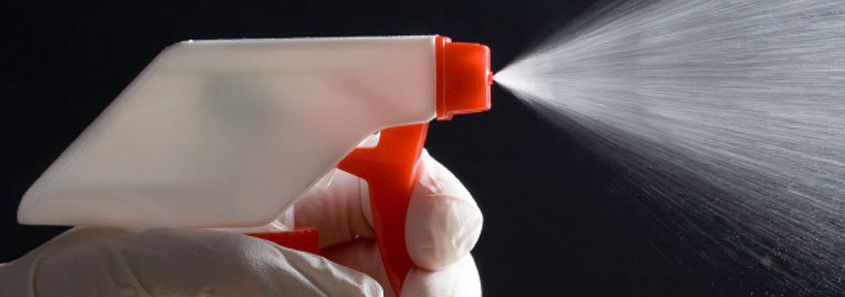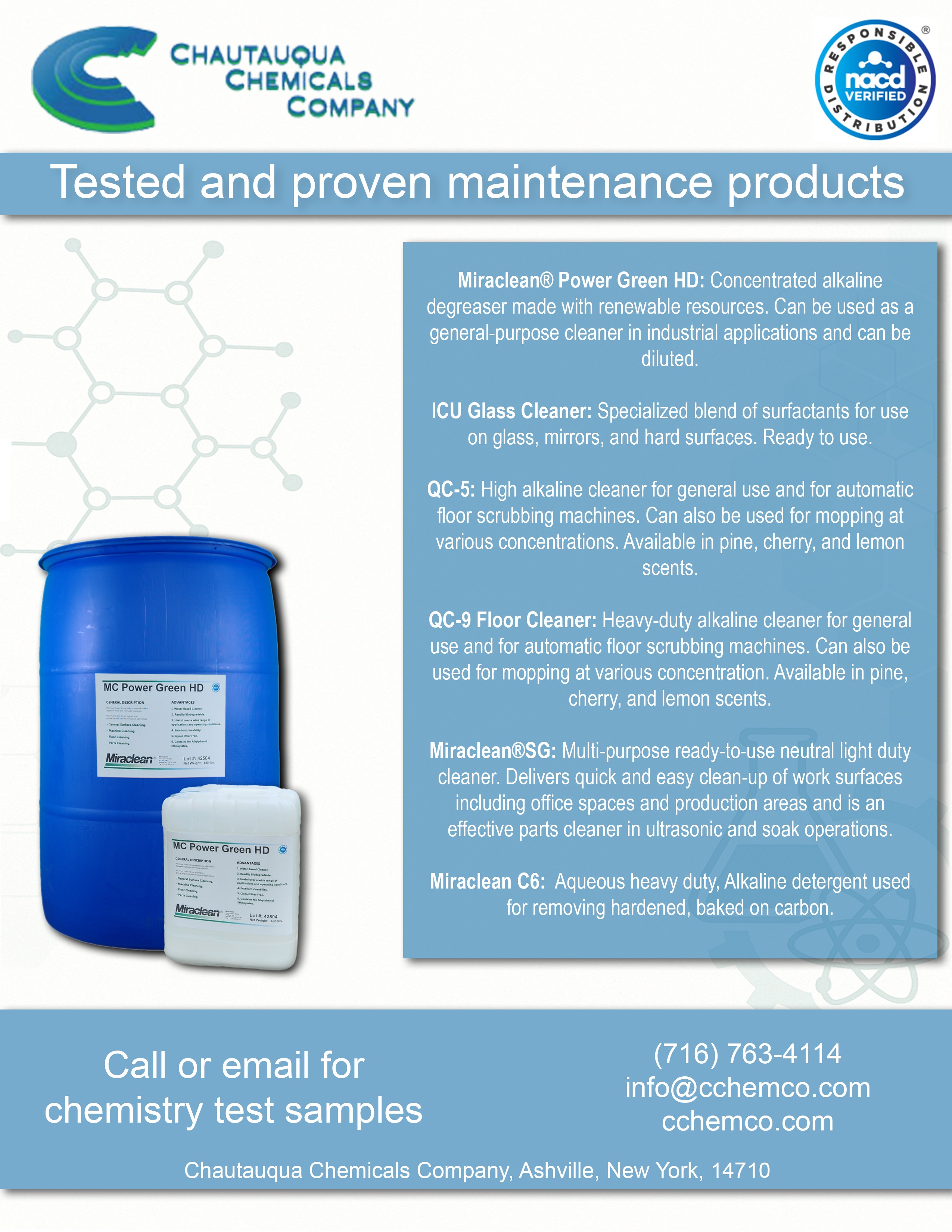
Green Cleaning: How Eco-Friendly Solutions Aid in Industrial Preventive Maintenance
Maintenance cleaning in industrial manufacturing facilities is essential for ensuring the reliability, safety, and efficiency of operations. Regular cleaning helps prevent the buildup of dirt, grease, and contaminants that can cause machinery to malfunction, reduce product quality, or create hazardous working conditions. By using proper maintenance cleaning practices, facilities can minimize unplanned downtime, extend equipment lifespan, and maintain compliance with industry regulations. Ultimately, effective cleaning supports continuous production and contributes to a safer, more efficient, and more sustainable manufacturing environment.
Preventive Maintenance: The Role of Cleaning Chemicals in Reducing Downtime
- Improves Product Quality – Clean machinery minimizes defects and maintains consistent production standards.
- Lowers Repair Costs – Identifies minor issues early before they escalate into expensive repairs or replacements.
- Extends Equipment Lifespan – Prevents buildup of dust, debris, and contaminants that can cause wear and tear.
- Enhances Workplace Safety – Prevents accidents caused by slippery surfaces, malfunctioning equipment, or dust-related hazards.
- Reduces Equipment Downtime – Regular cleaning helps prevent breakdowns and keeps machinery running efficiently.
Industries Served
- Manufacturing – For equipment degreasing, parts washing, and general facility upkeep.
- Textile Industry – To clean dyeing machines, printing systems, and production lines.
- Electronics and Semiconductor – For precision cleaning of sensitive components and cleanroom equipment.
- Marine and Shipping – For cleaning hulls, engines, and onboard systems to prevent salt corrosion and biofouling.
- Pulp and Paper – To remove resin, ink, and fiber buildup in processing equipment.
- Construction – To clean tools, machinery, and concrete surfaces.
- Water and Wastewater Treatment – For maintaining pumps, tanks, and pipe systems free of scale and biological fouling.
- Mining and Heavy Equipment – For removing dirt, grease, and buildup from large, high-use machinery
- Power Generation – For cleaning turbines, boilers, and cooling systems to maintain efficiency.
- Aerospace and Aviation – To clean precision parts and prevent corrosion in high-performance systems.
- Pharmaceutical and Healthcare – For sterile cleaning of production environments and machinery.
- Food and Beverage Processing – To ensure hygienic conditions through sanitizing and degreasing equipment and surfaces.
- Automotive and Transportation – For cleaning engines, mechanical parts, and maintaining workshop tools and surfaces.
- Oil and Gas – To remove hydrocarbons, prevent corrosion, and maintain drilling and processing equipment.
Safety & Handling
-
Read and Follow Safety Data Sheets (SDS): Always review the SDS for each chemical to understand hazards, proper handling, and emergency measures.
-
Wear Appropriate PPE: Use gloves, goggles, respirators, or protective clothing as required for the specific chemical.
-
Ensure Proper Ventilation: Work in well-ventilated areas or use fume hoods to avoid inhalation of fumes or vapors.
-
Label and Store Chemicals Properly: Keep all chemicals in labeled, approved containers and store according to compatibility and hazard class.
-
Use Spill Containment Measures: Have spill kits and containment systems readily available; clean up spills immediately using proper procedures.
-
Avoid Direct Contact: Never touch chemicals directly with bare hands or inhale fumes deliberately.
-
Dispose of Chemicals Correctly: Follow regulatory guidelines and company procedures for disposal to avoid environmental and health hazards.
Waste Management
-
Identify and Classify Waste: Determine if the used cleaners are hazardous or non-hazardous according to regulatory standards (e.g., EPA, OSHA).
-
Label Waste Containers Clearly: Use durable labels that identify the contents, hazard class, and accumulation start date.
-
Use Compatible Storage Containers: Store cleaners and waste in containers made of materials resistant to the specific chemicals they hold.
-
Segregate Incompatible Wastes: Keep acids, bases, solvents, and other reactive substances separate to avoid dangerous chemical reactions.
-
Minimize Waste Generation: Use the correct amount of cleaner, implement preventive maintenance, and consider switching to less hazardous or reusable products.
-
Train Employees Regularly: Ensure all personnel understand proper handling, storage, and emergency procedures related to chemical waste.
-
Maintain Spill Response Kits: Place kits in easily accessible areas and ensure workers know how to use them.
-
Track Waste Accumulation and Disposal: Keep accurate records of waste generation, storage time limits, and disposal methods for regulatory compliance.
-
Partner with Certified Disposal Vendors: Use licensed and reputable waste management companies to handle and dispose of hazardous waste.
-
Conduct Routine Inspections and Audits: Regularly inspect storage areas and practices to identify risks, ensure compliance, and improve safety.
Selecting the Optimal Maintenance Solution for You
Selecting industrial maintenance chemicals for cleaning in manufacturing facilities involves evaluating both performance and safety. Begin by identifying the specific cleaning needs—such as removing grease, scale, or corrosion—and matching them with chemicals formulated for those tasks. Consider the material compatibility of surfaces to avoid damage, and prioritize products that are effective yet pose minimal health and environmental risks. Review Safety Data Sheets (SDS) to understand hazards, handling requirements, and disposal procedures. Where possible, choose cleaners that are biodegradable, non-toxic, and compliant with local environmental regulations. Involve EHS (Environmental, Health, and Safety) personnel in the selection process to ensure regulatory compliance and workplace safety.
If you would like assistance in choosing the correct product for your specific application, feel free to reach out to Chautauqua Chemicals Co., Inc. for a recommendation. Our product list is below, or you can also visit our full listing through the below button.
General All Purpose
- Miraclean®SG: Multi-purpose ready-to-use neutral light duty cleaner. Delivers quick and easy clean-up of work surfaces including office spaces and production areas and is an effective parts cleaner in ultrasonic and soak operations.
- Miraclean® Power Green HD: Concentrated alkaline degreaser made with renewable resources. Can be used as a general-purpose cleaner in industrial applications and can be diluted.
- Miraclean C6: Aqueous heavy duty, Alkaline detergent used for removing hardened, baked on carbon.
Floor Cleaning
- QC-9 Floor Cleaner: Heavy-duty alkaline cleaner for general use and for automatic floor scrubbing machines. Can also be used for mopping at various concentration. Available in pine, cherry, and lemon scents.
- QC-5: High alkaline cleaner for general use and for automatic floor scrubbing machines. Can also be used for mopping at various concentrations. Available in pine, cherry, and lemon scent.
Glass Cleaning
- ICU Glass Cleaner: Specialized blend of surfactants for use on glass, mirrors, and hard surfaces. Ready to use.
Chautauqua Chemicals Co., Inc. Contact
We can be reached any on the following ways to help with your chemical needs. We offer free testing of your parts to help determine optimal concentration and temperature to achieve clean parts.
Phone: (716)763-4114
Fax: (716)763-5555
Email: info@cchemco.com
Address: 4743 Cramer Dr.
Ashville, NY 14710

